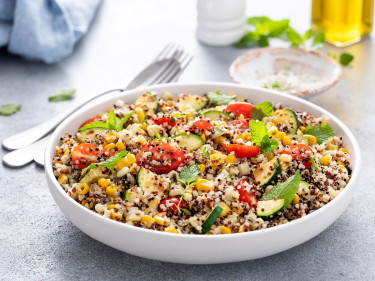The short answer? Yes.
From childhood to adolescence, adulthood, pregnancy, and menopause, the female body goes through many stages; and with that your nutrition needs change. Small changes to your eating patterns means you can meet your body's nutrient needs!
Childhood
If you’ve got young children, it can be tricky to predict their eating patterns; and even harder to stop stressing about whether they’re eating too little or too much.
The key thing to remember for developing healthy eating habits in kids is not to give up and try not to stress when they don’t want to eat everything on their plate!
For kids around the age of three, their veggie intake is actually strongly influenced by what their parents eat - monkey see, monkey do. So if you want your kids to eat a wider range of veggies, start to introduce more variety into your own meal!
Adolescence
During adolescence teenagers might start to experiment with different dietary approaches, for example vegan or vegetarian. The key nutrient to remember is iron, which can be found in plant based foods such as legumes, wholegrains, green leafy vegetables, nuts, seeds and fruit (fresh and dried).
Once girls start menstruating their iron requirements are much greater, so it’s important to ensure you’re getting enough iron in your diet.
It’s also often around this time that teenagers will start to develop acne, which in some cases can be aided with diet in conjunction with medical treatment.
Pregnancy
During pregnancy, your nutrient needs change. The developing baby is like an in utero sponge, so to optimise the baby’s growth and development it’s best to fuel your body with nutritious food.
It can also be overwhelming understanding what to eat and avoid during pregnancy. The key nutrients to remember are protein, folate, calcium, iron, zinc, iodine and fibre!
Due to hormonal changes, some diet related problems such as heartburn and constipation can kick off during pregnancy.
While this can be helped by making changes to your eating patterns, it’s best to mention it to your obstetrician or GP in case you need additional strategies..
Once the baby is born your needs change again to meet the nutrient requirements associated with breastfeeding.
Menopause
All women are prone to gaining weight during menopause, regardless of whether you lived a healthy lifestyle beforehand, with the average weight gain being around 2.5kg.
This is a combination of hormonal and lifestyle changes. For example, it’s usually around this time that there may be less housework, you may have more disposable income allowing you to eat out more, or you may have more time to enjoy a wine or two. It’s the perfect storm!
However, studies have shown that during this menopausal transition, women who changed their lifestyle behaviours by doing things such as eating more vegetables, trying healthier recipes or going for walks did not gain the average 2.5kg. So you can get through menopause without the weight gain, but unfortunately you have to be on guard!
75+
Once you start approaching 75, your dietary requirements begin to shift. As you age, your body starts to protect itself from losing muscle tissue (a condition known as sarcopenia), which means your protein requirements actually go up.
It’s important to reduce your salt intake to lower your risk of heart disease, and eat nutritious foods, in particular vegetables, and protein rich foods such as lean meat, dairy, and eggs.
Your nutritional needs continue to change throughout life. Take the Healthy Eating Quiz today to find out how healthy your diet is and ways you can improve it!













